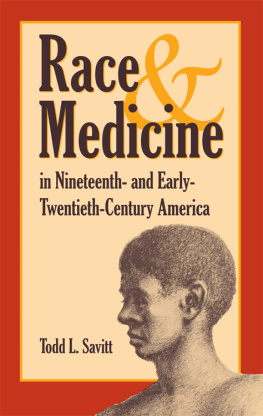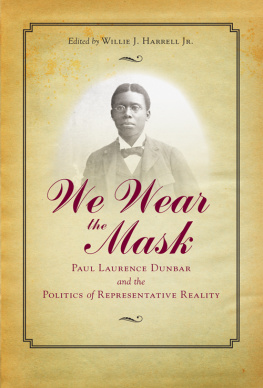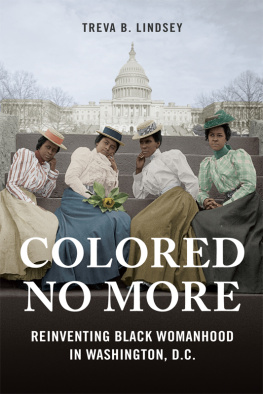University of Virginia Press
2019 by the Rector and Visitors of the University of Virginia
All rights reserved
Printed in the United States of America on acid-free paper
First published 2019
ISBN 978-0-8139-4212-4 (cloth)
ISBN 978-0-8139-4213-1 (ebook)
1 3 5 7 9 8 6 4 2
Library of Congress Cataloging-in-Publication Data is available for this title.
Cover art: Josephine J. Turpin Washingtons 1886 graduating class, Howard College.
(Courtesy of the Moorland-Spingarn Research Center, Manuscript Division, Howard University, Washington, DC)
Acknowledgments
As I reflect on those who have supported me in this small but demanding project, I am reminded of John Donnes adage No [wo]man is an island. To all those who have assisted me in bringing this manuscript to completion, I give thanks.
Special thanks go to my Virginia State University colleagues Leah Thomas, Gary MacDonald, and Michael McClure, who read several drafts of the proposal and introduction during our monthly meetings as a writing group. I thank them immensely for their encouraging words and constructive comments that moved the project forward.
I am indebted to my dear friend Patricia Fleming, who drove many miles to archives and libraries with me. Without her assistance with long-distance driving, the manuscript would still be incomplete.
The archivists and staff at several libraries and institutions are due thanks: Christina Jordan Dunn, Acting Director, Goochland County Historical Society; Heather Dawn Beattie, Museum Collections Manager, Virginia Historical Society; Meaghan A. Alston, MLIS, Manuscript Division, Moorland-Spingarn Research Center, Howard University; Joellen El Bashir, Curator, Moorland-Spingarn Research Center, Howard University; Catherine Curry, Reference Librarian, Jacksonville Public Library, Florida; Arlene Balkansky, Reference Specialist, Newspaper and Current Periodical Reading Room, Library of Congress; Dana Chandler, University Archivist, Tuskegee University; Howard O. Robinson II, Archives Coordinator, Levi Watkins Learning Center, Alabama State University; and Glenda Puckett, Archivist, Alabama Department of Archives and History. Their knowledge and assistance led me to new discoveries about the works and life of Josephine Turpin Washington.
I extend special thanks to Dave Grabarek, Circulation and Archival Assistant, Library of Virginia, for speedily retrieving reels of difficult-to-obtain African American newspapers and for enlarging print copies of newspaper articles.
To the librarians at Virginia State University, I express gratitude for their kind outreach from the time I entered the portals of Johnston Memorial Library until I left. Special thanks are extended to Nelson Jefferson, Library Assistant; Anthony Lewis, Circulation Assistant; and Louveller Luster, Collection Development Librarian.
And, finally, I thank University of Virginia Press, my first choice for a publisher, for its interest in my manuscript.
Introduction
Josephine Turpin Washington (18611949) is a unique voice in African American literary studies. The quality and content of Washingtons writings assisted the development of the black press in a historical era when few African Americans were literate. Written within the historical context of post-Reconstruction racial and gender uplift, Washingtons essays are significant for their contributions to an emerging black press as they disrupt the nineteenth-century African American literary canon prioritizing slave narratives; they pave the way for the race womanhood ideology depicted in later nineteenth-century African American womens novels; they link to biblical scriptures and to European and American literatures to support racial uplift ideology; and they serve as guides, articulating the responsibilities and aesthetic standards that will allow the black press to establish a reputable literary sphere.
Historical Context: Post-Reconstruction Era and Racial and Gender Uplift
The Post-Reconstruction era (18771920) is often referred to as the nadir of African American life. Blacks faced a precipitous erosion of gains won during the 186577 military occupation of the South. Southern states, formerly associated with the Confederacy, defied the Fifteenth Amendment of 1870 that had granted suffrage to black men. Extralegal voting activities were prominent. A dual, unequal educational system was established; Black Codes were instituted; trade unions ostracized blacks; race and gender stereotypes were promoted; and violence, including lynching, accompanied the indignities of Jim Crow law. Race-based discrimination became legal with the 1896 Supreme Court decision in Plessy v. Ferguson. The separate but equal mandate used to support Louisianas segregated public transportation system became the legal justification for racial segregation throughout the South. These egregious harms debilitated and impeded the social progress of the majority of blacks. Reduced to second-class citizenship, they struggled to attain self-sufficiency, while white America transformed itself into an impressive empire with expanded transportation systems, industrialized markets, annexed territories, and the explosive growth of European and Scandinavian emigrants. The black middle class, whom W. E. B. Du Bois much later would label the Talented Tenth, committed itself to uplift the race and shield it from others negative perceptions. One of the Talented Tenth, Washington shaped the conversation before Du Bois. Whereas Du Bois included only men among his Talented Tenth workers, Washington, as a woman writer, responded to an aggressive post-Reconstruction program of racial and gender uplift that African American conventions, churches, and presses facilitated.
Negro conferences played a major role in racial uplift efforts. They identified and found solutions for racial issues. An excerpt from the proceedings of the National Negro Conference held in 1879 in Nashville, Tennessee, reads: We are to a great extent the architects of our own fortunes, and must rely mainly on our own exertions for success. We, therefore, recommend to the youth of our race the observation of strict morality, temperate habits, and the practice of economy, the acquisition of land, the acquiring [of] agricultural education, of advancing to mercantile positions and forcing their way into the various productive channels of literature, art, science, and [mechanics]. The proceedings detail earnest avenues for racial uplift, the focus of the National Negro Convention since its inception in Philadelphia among free blacks in 1829, in response to northern white violence against southern black migrants in the North. Character building, education, employment, land ownership, and participation in the arts were as much the racial levers for blacks strides toward middle-class status in 1829 as in 1879. These were factors identified as keeping at bay crime, state dependency, chronic unemployment, and ignorance.

Josephine Turpins 1886 graduating class, Howard College: Kelly Miller Sr., seated left; Josephine J. Turpin, center; William Palmer, seated right. (Courtesy of the Moorland-Spingarn Research Center, Manuscript Division, Howard University, Washington, DC)
Womens clubs and their conventions were the germinating seeds for some of Washingtons essays. The most notable were the Alabama Federation of Colored Womens Clubs (FCWC) and the Sojourner Truth Club, which focused on literary interests. Organized 19 December 1899, the State Federation of Colored Womens Clubs was a chapter of the National Association of Colored Womens Clubs (NACWC), the successor of the National Conference of Colored Women, The attendees at this convention, known as National Conference of Colored Women, resolved to denounce [Jacks] as a man wholly without a sense of chivalry and honor, and bound by the iron hand of prejudice, sectionalism and race hatred, entirely unreliable and unworthy [of] the prominence he seeks. As a result of this convention, the National Conference of Colored Women expanded and became the National Federation of Afro-American Women, an organization devoted to the needs of black women and the race.







